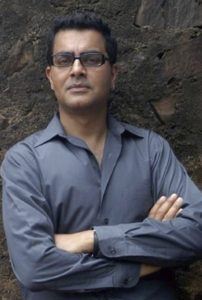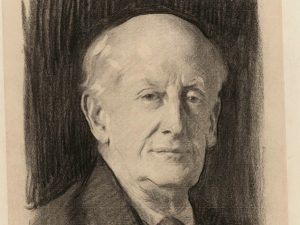Alison Flood in The Guardian:
 Emtithal Mahmoud was brimming with rage and misery when she sat down to write her poem Mama. Her grandmother had just died in Sudan, her mother was on a plane to the funeral and she felt consumed by anger. “I wrote it in one of the darkest times of my life,” she says. “It felt like my grandmother had survived everything, the war, famine, and in the end it was not just cancer, it was lack of access to proper medical research. It was a very dark time. And that poem helped me get through it.” Hours after writing Mama, Mahmoud – also known as Emi, who was born in Darfur but moved to the US from Yemen as a four-year-old – performed it at the 2015 Individual World Poetry Slam Championship in Washington DC – and won the competition. Full of fury, Mama opens as a man asks Mahmoud: “Hey yo sistah, you from the motherland? … ’cause you got a little bit of flavor in you, / I’m just admiring what your mama gave you.” It becomes a paean to Mahmoud’s mother, who “can reduce a man to tattered flesh without so much as blinking”, who “walks into a war zone and has warriors cowering at her feet”.
Emtithal Mahmoud was brimming with rage and misery when she sat down to write her poem Mama. Her grandmother had just died in Sudan, her mother was on a plane to the funeral and she felt consumed by anger. “I wrote it in one of the darkest times of my life,” she says. “It felt like my grandmother had survived everything, the war, famine, and in the end it was not just cancer, it was lack of access to proper medical research. It was a very dark time. And that poem helped me get through it.” Hours after writing Mama, Mahmoud – also known as Emi, who was born in Darfur but moved to the US from Yemen as a four-year-old – performed it at the 2015 Individual World Poetry Slam Championship in Washington DC – and won the competition. Full of fury, Mama opens as a man asks Mahmoud: “Hey yo sistah, you from the motherland? … ’cause you got a little bit of flavor in you, / I’m just admiring what your mama gave you.” It becomes a paean to Mahmoud’s mother, who “can reduce a man to tattered flesh without so much as blinking”, who “walks into a war zone and has warriors cowering at her feet”.
“Don’t talk about the motherland unless you know / that being from Africameans waking up an / afterthought in this country. / Don’t talk about my flavor unless you know / that my flavor is insurrection, it is rebellion, / resistance,” Mahmoud recited, bringing the audience to their feet and receiving a perfect score
In London on a flying visit to the UK – she’s been in Birmingham speaking on Philanthropy Age’s How to Do Good tour – Mahmoud is overflowing with charisma. She has so much to talk about, from working in refugee camps in Greece (she pulls out a wallet made from a life jacket a boy on Lesbos gave her) to meetings with the Dalai Lama (“He said: ‘There’s a lot of pain in Darfur and in Sudan’ and I was like, ‘There is’. He held my hand for a bit and I said, ‘I’m working on it and we’re with you.’”) But she’s getting ahead of herself. She turned 22 shortly after winning the slam, at which point her life started to become a little surreal. Still a student at Yale, where she was studying molecular, cellular and developmental biology and anthropology, Mahmoud was chosen as one of the BBC’s 100 most inspirational women in 2015, and wrote the poem The Things She Told Me to mark the honour.
More here.
 Novelist, poet, and essayist Amitava Kumar has often pondered the differences between a writer and a rioter.
Novelist, poet, and essayist Amitava Kumar has often pondered the differences between a writer and a rioter.
 Some nightmares, the worst ones, move so slowly that you don’t wake up from them right away. The terror feels normal, even though you may know something’s not right. It’s a usual sort of bad feeling, typical enough to fool the mind into believing that you may be awake. That is, until the monster shows up. Only then does the brain recognize it is inside something that isn’t real. “Sharp Objects,” HBO’s latest limited series from “Dietland” creator Marti Noxon and Jean-Marc Vallée, and based on a novel by Gillian Flynn (“Gone Girl”), reproduces that sensation throughout the seven of its eight episodes that were provided for review.
Some nightmares, the worst ones, move so slowly that you don’t wake up from them right away. The terror feels normal, even though you may know something’s not right. It’s a usual sort of bad feeling, typical enough to fool the mind into believing that you may be awake. That is, until the monster shows up. Only then does the brain recognize it is inside something that isn’t real. “Sharp Objects,” HBO’s latest limited series from “Dietland” creator Marti Noxon and Jean-Marc Vallée, and based on a novel by Gillian Flynn (“Gone Girl”), reproduces that sensation throughout the seven of its eight episodes that were provided for review. ON JUNE
ON JUNE  In spite of the obsession with Soros, there has been surprisingly little interest in what he actually thinks. Yet unlike most of the members of the billionaire class, who speak in platitudes and remain withdrawn from serious engagement with civic life, Soros is an intellectual. And the person who emerges from his books and many articles is not an out-of-touch plutocrat, but a provocative and consistent thinker committed to pushing the world in a cosmopolitan direction in which racism, income inequality, American empire, and the alienations of contemporary capitalism would be things of the past. He is extremely perceptive about the limits of markets and US power in both domestic and international contexts. He is, in short, among the best the meritocracy has produced.
In spite of the obsession with Soros, there has been surprisingly little interest in what he actually thinks. Yet unlike most of the members of the billionaire class, who speak in platitudes and remain withdrawn from serious engagement with civic life, Soros is an intellectual. And the person who emerges from his books and many articles is not an out-of-touch plutocrat, but a provocative and consistent thinker committed to pushing the world in a cosmopolitan direction in which racism, income inequality, American empire, and the alienations of contemporary capitalism would be things of the past. He is extremely perceptive about the limits of markets and US power in both domestic and international contexts. He is, in short, among the best the meritocracy has produced. Spiders have no wings, but they can take to the air nonetheless. They’ll climb to an exposed point, raise their abdomens to the sky, extrude strands of silk, and float away. This behavior is called ballooning. It might carry spiders away from predators and competitors, or toward new lands with abundant resources. But whatever the reason for it, it’s clearly an effective means of travel. Spiders have been found two-and-a-half miles up in the air, and 1,000 miles out to sea.
Spiders have no wings, but they can take to the air nonetheless. They’ll climb to an exposed point, raise their abdomens to the sky, extrude strands of silk, and float away. This behavior is called ballooning. It might carry spiders away from predators and competitors, or toward new lands with abundant resources. But whatever the reason for it, it’s clearly an effective means of travel. Spiders have been found two-and-a-half miles up in the air, and 1,000 miles out to sea. The starkest example of the many racist and anti-poor measures directed at African Americans and passed during his administration was the 1996 welfare reform bill, which transformed welfare from an exclusive and unequal cash assistance system that stigmatized its recipients into one that actually criminalized them.
The starkest example of the many racist and anti-poor measures directed at African Americans and passed during his administration was the 1996 welfare reform bill, which transformed welfare from an exclusive and unequal cash assistance system that stigmatized its recipients into one that actually criminalized them. Emtithal Mahmoud was brimming with rage and misery when she sat down to write her poem Mama. Her grandmother had just died in
Emtithal Mahmoud was brimming with rage and misery when she sat down to write her poem Mama. Her grandmother had just died in  In the 12 wide-ranging stories of her latest collection, “Days of Awe,” A. M. Homes skillfully circles and tugs at the question of what it means to live in flawed, fragile, hungry human bodies. One character embeds rose thorns in her feet; several have very disordered eating habits; people die too young, go to war and hold in their cells and minds the memories of past trauma. The title story is about a war reporter and a novelist who meet at a conference on genocide and have a weekend affair. Here the body is death — the millions killed who haunt the conference attendees — but it’s also desire. The affair is vivid and real and yet there is a shard of violence in it, the everyday violence of two people using each other to counter pain they don’t know how to digest.
In the 12 wide-ranging stories of her latest collection, “Days of Awe,” A. M. Homes skillfully circles and tugs at the question of what it means to live in flawed, fragile, hungry human bodies. One character embeds rose thorns in her feet; several have very disordered eating habits; people die too young, go to war and hold in their cells and minds the memories of past trauma. The title story is about a war reporter and a novelist who meet at a conference on genocide and have a weekend affair. Here the body is death — the millions killed who haunt the conference attendees — but it’s also desire. The affair is vivid and real and yet there is a shard of violence in it, the everyday violence of two people using each other to counter pain they don’t know how to digest. At the age of 39 I was fairly sure I would spend the rest of my life alone. I lived alone, I worked alone. No matter what I did, or who I dated, I didn’t seem to be able to find the relationship I longed for.
At the age of 39 I was fairly sure I would spend the rest of my life alone. I lived alone, I worked alone. No matter what I did, or who I dated, I didn’t seem to be able to find the relationship I longed for. If the ICS [International Commission on Stratigraphy] declares the Anthropocene as a new epoch, it will reverse at one stroke three great humiliations science has inflicted on humanity. First, it will restore humanity to the self-importance it knew when people believed that the Earth and humanity were created at about the same time. The Anthropocene, as Erle Ellis and colleagues have written, “will divide Earth’s story into two parts: one in which humans are a geological superpower — an epoch called the Anthropocene — and the other encompassing all that came before our species had a major influence on Earth’s functioning.”
If the ICS [International Commission on Stratigraphy] declares the Anthropocene as a new epoch, it will reverse at one stroke three great humiliations science has inflicted on humanity. First, it will restore humanity to the self-importance it knew when people believed that the Earth and humanity were created at about the same time. The Anthropocene, as Erle Ellis and colleagues have written, “will divide Earth’s story into two parts: one in which humans are a geological superpower — an epoch called the Anthropocene — and the other encompassing all that came before our species had a major influence on Earth’s functioning.” “Democracies erode slowly, in barely visible steps” these days, Steven Levitsky and Daniel Ziblatt write in
“Democracies erode slowly, in barely visible steps” these days, Steven Levitsky and Daniel Ziblatt write in  The tropics are, like many cities, hot, busy and crowded. It was previously thought
The tropics are, like many cities, hot, busy and crowded. It was previously thought Fireworks, hypnotic and sublime, are used to celebrate national independence around the globe, as signs of sovereignty or political autonomy. They are the window dressing of the modern state. The exploding rainbows are a tribute to the bloody wars that made the celebration possible. They are a reminder that—under that same sky and upon that same land to which the ashes float—we are kinfolk.
Fireworks, hypnotic and sublime, are used to celebrate national independence around the globe, as signs of sovereignty or political autonomy. They are the window dressing of the modern state. The exploding rainbows are a tribute to the bloody wars that made the celebration possible. They are a reminder that—under that same sky and upon that same land to which the ashes float—we are kinfolk. We are living in new Bayesian age. Applications of Bayesian probability are taking over our lives. Doctors, lawyers, engineers and financiers use computerized Bayesian networks to aid their decision-making. Psychologists and neuroscientists explore the Bayesian workings of our brains. Statisticians increasingly rely on Bayesian logic. Even our email spam filters work on Bayesian principles.
We are living in new Bayesian age. Applications of Bayesian probability are taking over our lives. Doctors, lawyers, engineers and financiers use computerized Bayesian networks to aid their decision-making. Psychologists and neuroscientists explore the Bayesian workings of our brains. Statisticians increasingly rely on Bayesian logic. Even our email spam filters work on Bayesian principles.